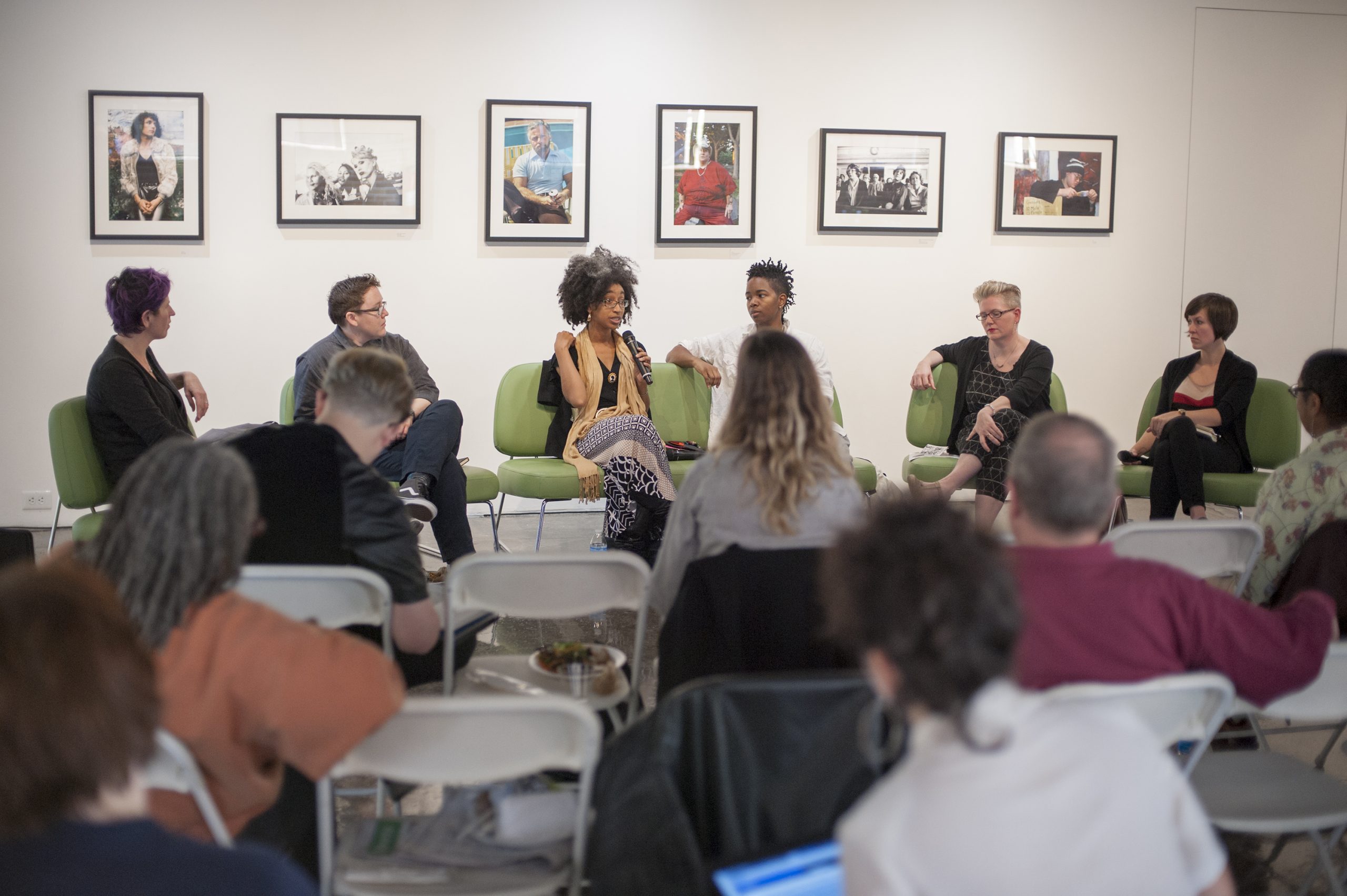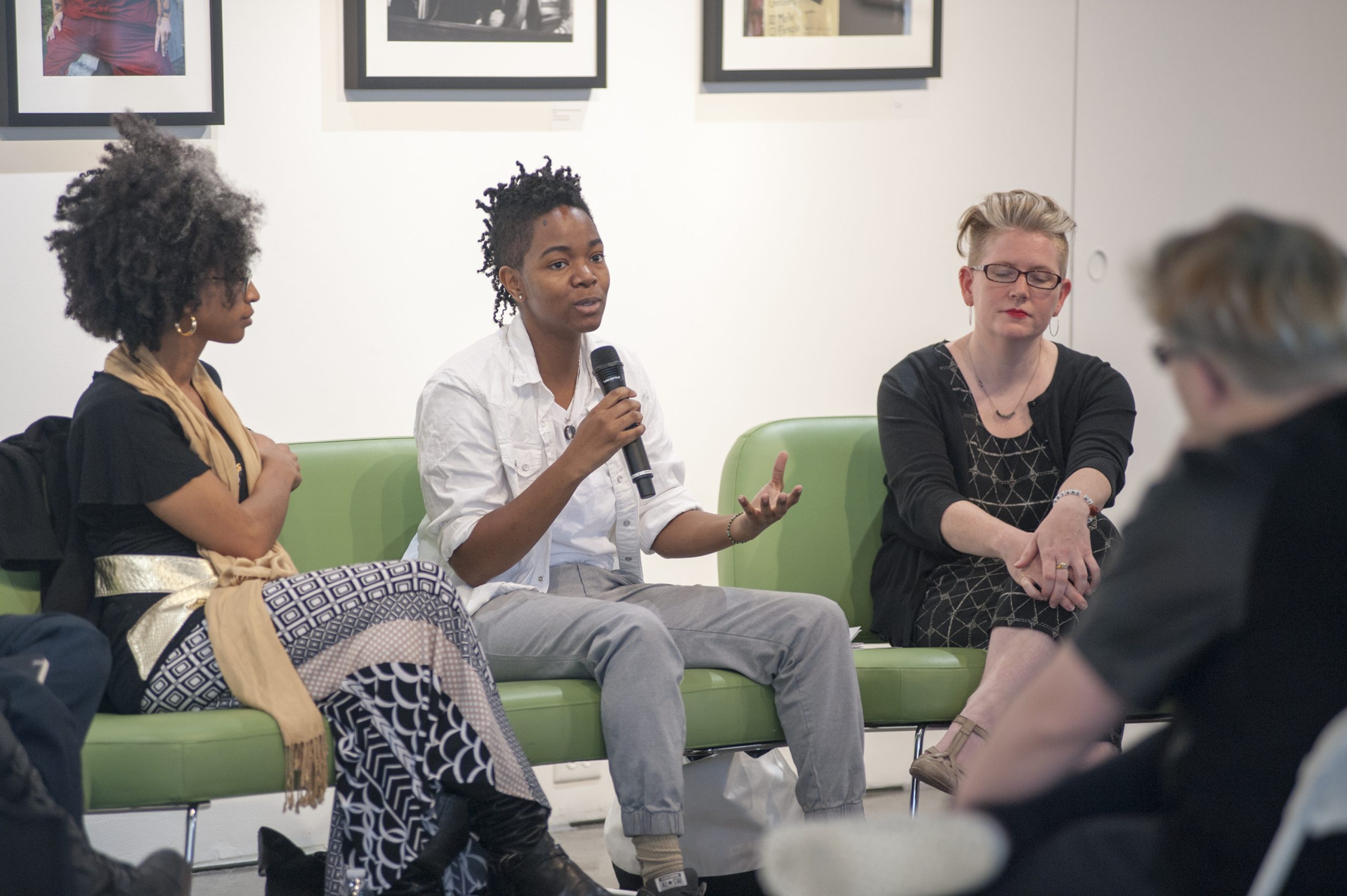Generous Listening
December 19, 2016
“You know how you’re not supposed to be thinking while the other person is talking, right? You’re supposed to be listening.” Julia Roxanne Wallace, a participant in our discussion about archiving LGBTQ+ lives, laughed as she acknowledged the challenge of being a good panelist.
By Margaret (Lou) Brown

Archiving LGBTQ+ Lives discussion at The Power Plant Gallery
By prefacing her remarks with this comment, she shared openly something most of us struggle with internally – how to be attentive listeners AND be prepared to contribute an insightful comment when our turn comes.
We know it’s not much of a discussion if each of us spends more energy mentally composing our own ideas than we spend opening ourselves to what others are saying. Yet, we also want to demonstrate knowledge and attentiveness in the form of our own well-formulated comments. It can be hard work to be a respectful conversation partner, to give our attention fully to another.
Julia’s comment cut through the “fourth wall” between the speakers on stage and the audience members. Letting us know that she, as a member of the panel speaking about issues she knows deeply, shared our struggle to listen well, she simultaneously reminded us of the need to suppress our own inner comment composer and called us closer into the conversation. In that moment, we all felt the importance of doing the work to support each other’s listening, and we became a bit more still as Julia talked about the sacredness of people and their stories and the need to tend them carefully. The work of audience and panelist became more interlaced.

L-R: Alexis Pauline Gumbs, Julia Roxanne Wallace, Kelly Wooten
We’ve been reminded throughout this fall semester that meaningful collaboration rests on the generosity of listening. This is true for all of our events, but our programs with the Power Plant Gallery deserve special attention for the insights they gave us into both the challenges we share with non-university-based community members and the exceptional creativity of our neighbors who run galleries, arts education programs, and archives in our communities. In our discussions about “Arts Activism in Durham” and “Archiving LGBTQ+ Lives”, we listened and learned about practices of accessibility, community-building, and sustainability.
Who is an exhibit or performance or archival collection for? Do the designs of our physical spaces exclude members of our communities? Does our advertising reach our intended audiences? Do people trust us with their stories and their documents and their art and their children and their ancestors? Are we giving enough of ourselves to build relationships that invite people into our virtual and material spaces? Are we supporting each other as much as we can? Are we willing to be led by others? Our panelists were addressing core questions about their work that also are central questions for the work of the Forum for Scholars and Publics. It was energizing, reassuring, and humbling to listen as they talked about their stumbles and successes as they aspire to create welcoming community spaces.
Panelists talked about the foundational practices of inclusivity, and the need to embrace the hard, active work that is necessary to make spaces truly inclusive. And a lot of that work is accomplished by being present in the community, by listening, by imagining oneself in another’s shoes, and by being willing to let go of control. How do we make it easier for community members trying to enter our spaces? How do we develop relationships in which our neighbors can honestly tell us what they expect from us? How do we prepare ourselves to listen when they do?

Arts Activism in Durham discussion
There was a powerful sense of responsibility among all of our collaborators on these programs to live up to their community commitments. Each experience they shared gave us new insights into the ways public programs bump up against barriers for participation and spawn supportive, creative responses. An archive is in Spanish and incorporates gender-inclusive keywords; can the staff who oversee the space be trained to be similarly multilingual and welcoming? Someone in the community may want to save documents and photos of a current social movement, but have precarious housing; how can their desire to share their experience with others be honored? A gallery moves into a gentrifying neighborhood and wants to connect with existing neighbors; how do they rethink their modes of engagement to meet their neighbors' needs and expectations?
The conversations were too rich to summarize here, a fact that itself raises another question: how do we carry forward what we learned, making sure we do justice to what has been given to us? We'll continue our work to create spaces on campus and off that allow for this sort of collaboration between audience and panelist, where each is acutely aware of the necessary work being done by the other in the conversation. We're grateful to participate in a community-wide network of support that is made stronger with each interaction.
We'll partner again with the Power Plant Gallery in the spring, so watch our calendar for those events. And please take a few minutes to explore our project pages for the two discussions mentioned in this post to learn about the amazing community partners who joined us for these conversations: Arts Activism in Durham and Archiving LGBTQ+ Lives.
Banner image by Vanderlei Bailo (feito por mim) [GFDL (http://www.gnu.org/copyleft/fdl.html), CC-BY-SA-3.0 (http://creativecommons.org/licenses/by-sa/3.0/) or CC BY-SA 2.5-2.0-1.0 (http://creativecommons.org/licenses/by-sa/2.5-2.0-1.0)], via Wikimedia Commons.

MARGARET (LOU) BROWN has worked for the last twenty years in interdisciplinary program development and community engagement. She holds a Ph.D. in sociocultural anthropology from Washington University in St. Louis, where she also taught and developed education and outreach programs in Anthropology, American Culture Studies, Social Thought and Analysis, and the Center for New Institutional Social Sciences. She is a Senior Research Scholar and the Director of Programs at the Forum for Scholars and Publics at Duke.
check us out
on social media